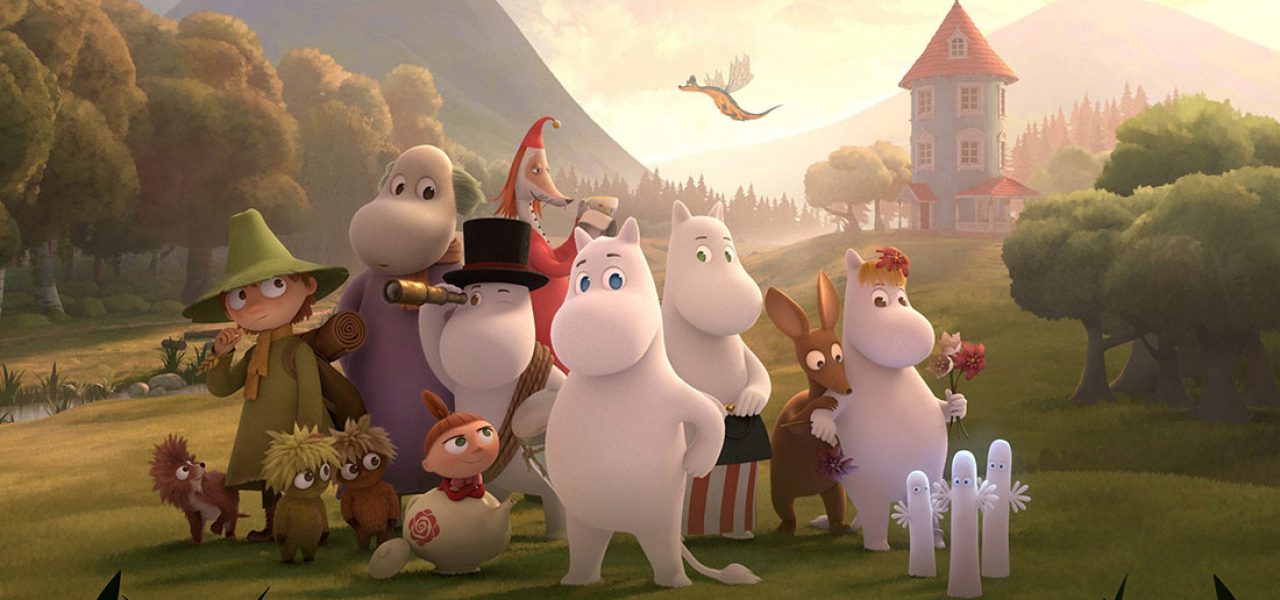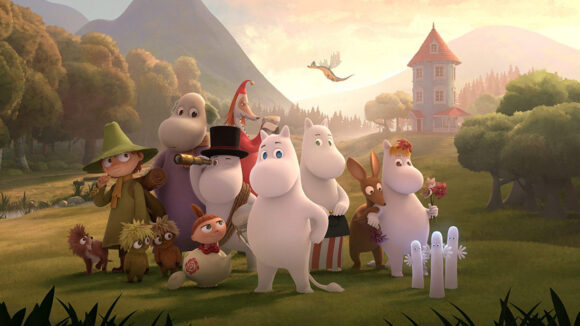

10 Tips For First-Time Showrunners, From People Who Did It — And Survived
Animated shows are thriving. There’s a hunger for fresh content, and the industry is expanding like never before. With that growth come many first-time showrunners. Directing your first show is hard — but there are ways to relieve the stress.
We’ve come up with ten tips and tricks, based on advice given to us by three showrunners who recently completed their first season. Lily Bernard, a concept artist at Cartoon Saloon, got her start on Puffin Rock (Ireland, 2015). For Steve Box, a veteran of Aardman Animations, the chance to make a series came in the form of Moominvalley (Finland/UK, 2019). Finally, animator and illustrator Pedro Eboli debuted with Netflix’s Cupcake & Dino: General Services (Brazil/Canada, 2018).
“It’s unlike anything I’ve done before,” says Eboli. Box reaches for a metaphor, comparing a show’s many episodes to “stacked-up airplanes that need to be safely landed.” Bernard adds that the job comes with an unimaginable number of meetings. All three have met with obstacles, fear, and self-doubt. With luck, their insights will make the process a bit easier for those aspiring to follow in their footsteps.
1. Respect your team
When creating an animated show, it’s not unusual to work on ten episodes at once. Showrunners rarely draw even a frame of their own project, so it’s important to trust and respect your team. It’s your job to “guide everyone along — until they’re up and running, at least,” says Box. “It’s like a constant process of handing over.”

That process is not easy for many first-timers, but it’s essential in getting the best out of your team, notes Eboli: “Delegating is an empathy exercise that goes both ways. First, you have to put yourself in the shoes of the people working in the show, and let them bring their A-game to it. Let them contribute with their own sensibility, their own jokes.”
Bernard had the same experience, recalling that “everyone was different and they’d surprise me all the time. If you trust your team, you’ll get good surprises.” It’s crucial to feel part of your team, she insists. “Don’t feel like an outsider — because you’re not. I did feel like that at one point, but you’ll learn that you can count on other people and they can count on you.”
2. Develop a healthy attitude to pressure
First-time showrunners risk being overwhelmed for all sorts of reasons. The creative responsibility for spending a few million, to name one. “I tend not to think about the budget, or I may start to fret,” Box says. “All it really means to me is time and resources — so actually the more money there is, the better.”
Bernard explains that she never felt this type of pressure, as she grew up without a lot of money, but somehow her family always made it work. “So I never thought about it [while working on Puffin Rock]. The money is there to spend and we just have to make the best possible use of it.”
How about the fear that you won’t finish everything on time? “Lists!” advises Eboli. “And have a Google Calendar or something similar. I have a notepad that’s always next to me, in which I always have written down all I need to deliver and when. Whenever I flip to a new page, I transpose all the unchecked items into it and keep adding new ones until I run out of space again.”
Or perhaps you’re worried about your own skills? You can translate your current skills into the ones you’ll need as a showrunner, says Bernard, who’d previously worked as a background designer on Cartoon Saloon’s feature Song of the Sea. “Backgrounds require an attention to detail that’s based on a lot of research. What we put on screen has to be something we see in real life, and then we process it and create our own vision of it on screen. [Running a show] has that same thought process.”
If all these coping strategies fail you, just remember that “everything is temporary,” reassures Bernard. “Everything passes after a while, or is at least diminished in intensity.”
3. Give constructive feedback
As we all know, it can be tough to receive feedback — so it’s crucial for showrunners to be mindful about how to deliver it. According to Box, it’s crucial simply to be clear, honest, and encouraging. “To me, every [adjustment] is just a step closer to perfection.”
Be specific in your feedback, all three showrunners stress. As Bernard puts it, “I tried not to drown people in information.” Eboli cautions, “Don’t be that ‘I’ll know when I see it’ person. Know what you’re asking for and why.” If you don’t know your “why,” ask yourself: Do you really need that change?
It’s also wise to consider the amount of feedback you’ve already given. Bernard says, “I’m not the person to give retakes until it’s super perfect. If there’s something small to change I can probably change it myself. The tempo can be tedious in series, so I try to be considerate of the energy that people put in their job.”
None of this means that you shouldn’t express what you don’t like, she adds. “Feedback doesn’t have to bring anybody down. Just say it early on so that everybody is like, ‘Ah okay, so that’s what you want!’ It’s simply about going back to the vision, the line for the project.”
4. Have a clear vision, and communicate it
As the project’s creative head, you’re expected to give people direction. “Hitting deadlines was a real challenge,” Box says. “The main — or only — way to stay on top of a situation like that is to take as much control as possible and to make clear, quick decisions and stick to them … The bottom line is: the less time you have, the more decisive you have to be.”
It’s important to realize that what’s obvious to you may not be to others, Bernard observes: “Nobody is in your head, so you have to say or show it.” Eboli agrees: “You can’t give [your team] nothing and then expect them to hit the bullseye.”
Subtleties often get lost in text, so use your drawing skills to make yourself understood. As Box says, “I’d thumbnail an entire episode (which took about three days) to give to the story team. I’d also draw sketches for the concept artist early on. I will act scenes out in person, record scratch dialogue myself for the animatics, even write songs, play and sing them. I’ll do absolutely anything to get my ideas across!”
The business side of the team can benefit from visual cues as well. Eboli recalls a Halloween script that had some executives worrying that Dino, one of his show’s lead characters, would look too scary.
“It wasn’t scary-scary, we wanted it to be funny-scary. Only it was hard getting that message across just through text, and some of the executives and producers were reticent about approving the script because of it. In the end, all it took was a doodle I did and sent to them, showing them how Dino could be funny-scary.” The script was then instantly approved.
5. Know your own skill set
The job of showrunner requires specific skills, some of which you’ll discover along the way. Bernard says she never imagined herself becoming a showrunner, as she wasn’t used to leading people. However, she realized that she likes “bringing people together [as] a team.” She adds that you’ll have to constantly adapt to new situations and different personalities in your team.
Eboli believes that his restlessness helped him greatly. “I’m someone who gets very antsy when doing the same thing for a long time … I didn’t have the superhuman focus that some of the best animators have. But this same ‘flaw’ works in my favor as a showrunner.”
It’s also important to know which skills you can fall back on when things get tough. In this context, Box cites his endless determination and patience to get things right. “I suppose I’m a perfectionist. I’m also very enthusiastic and committed to whatever I choose to work on, and that helps the project — and me — hugely.”
6. Know what drives you
As you’re committing to several years on one project, it’s crucial to know what motivates you. Eboli suggests surrounding yourself with amazing professionals — people who are “much, much better than you at every capacity.” About his time on Cupcake & Dino, he says, “I’d get scripts, designs, boards, animated scenes that are way better than anything I could ever do myself. This feeling of having your mind blown inside your own show is just the best.”
With Moominvalley, Box felt a sense of mission. “If you are going to head up something as massive as a remake of the Moomins and make it great, you won’t have a choice between life and work. It will just be work. So you have to love what you do with all your heart.” Bernard, a nature lover, felt similarly about Puffin Rock. “I wanted to make [the show] in a way that people watching it grow a love for animals, plants, nature. Because if you love something, you’ll want to take care of it.”
After a show’s first season, when the novelty has faded, showrunners often have to search for ways to stay inspired for subsequent seasons. Eboli recalls that feeling of having found the show after 20 or 22 episodes. After that, “it becomes about exploring, experimenting, and expanding.” For Cupcake & Dino, that meant trying out different worlds and genres. “[That was] us feeling emboldened by the familiarity we have with the show, and finding out-of-the-box ways to keep ourselves entertained.”
7. Consider your social life
When you’re creating your own show for the first time, it can be tempting to dedicate your whole being to it. Even so, Eboli warns, “know that it’s just work. It’s not worth sacrificing your life and relationships over it. These will last long after your show is over.”
Bernard recommends having activities outside animation: “Taking breaks to do other things enriches your life. Work is work.” When she’s on a Cartoon Saloon project, she rarely draws her own stuff after hours. Eboli does, but he’s not sure it’s a healthy habit. “Don’t become a work-obsessed professional,” he cautions. “Give your brain room to breathe. I love to cook, watch live-action movies, play board games, or just hang out with my loved ones. Do that!”
Box experienced thing differently: for him, running a show meant losing himself in his work. Luckily, he adds, his partner is an artist too, so she understands the nature of the job. “Without a partner that understands you, this would be impossible.” To Box, the only way to retrieve that work-life balance is “to make sure you can have a decent break once it’s all over, and reconnect with friends and family then — if they’ve waited for you. It is so hard to juggle both.”
8. Trust that things will get easier
While the wrap-up of a season might seem very distant at the start, you have to trust that things will fall into place. “Making the first season of a show is a discovery process more than anything,” Eboli says. “The voice of the show becomes not only more defined, but more confident, the more episodes you make.”
Bernard reaffirms this, recalling that work on Puffin Rock was most stressful at the start. “I had to think of everything, briefing the script writers, storyboarders, and designers, working on the library, making the key backgrounds … But after a while I got into a routine of creating new elements, supervising and art directing.”
More than art direction, Box’s job was focused on the stories and storyboards. “Once the animatics were locked, I handed them over to the episode directors, who guided the films on through the actual animation process. My job got a lot easier once the animatics were locked as I [would be] just checking in to review the progress.” He adds that you’ll want to be certain the stories are working before they leave the script phase, as you won’t have much time to adjust them later on.
9. Accept the struggle
As much as you can, try to make things easier for yourself and your team. “Pressure and enthusiasm are different sides of the same coin,” Eboli says. When asked about how he processed his responsibility as a showrunner, he answers, “Lots of coffee and recurring nightmares?”
As for Moominvalley, Box says, “The show was all-consuming. Almost every morning when I awoke, I would be jotting down solutions for issues I had solved overnight in my sleep. I never took my mind off work. It’s what I live for.”
Bernard doesn’t have a clear-cut solution — she says she simply struggled, a lot. “I can’t divide personal and work life easily. This is my passion. I put all my heart in my work, so if something [bad] happens it makes me sad.” It helped to remember that when you’re going through something for the first time, you’ll be able to manage it better when it happens again.
If you’re struggling with feedback from executives or the like, suggests Eboli, remember that your show is not just a passion project: it’s a weird intersection of commerce and art. “There’s a bunch of money on the line, money that is not yours (unless you own your production, which is rare). So respect that as well. Listen to the networks and the producers. You don’t always have to agree with them, but also it’s your job to find a place where everyone is happy (including yourself). If you love idea ‘A’ which the network hates, and the network loves an idea ‘B’ that you hate, then your job is to find idea ‘C’, where you can find your happy place, but also make sure you’re listening to some of their demands.”
10. Be kind to yourself
This final tip sounds obvious, but it’s easily forgotten in the hustle and bustle of work life. “At the beginning I was so absorbed by the job, I don’t even remember if I had anything after work,” Bernard says. “After some time, it got easier. At some point I realized it’s simply about staying away from the computer every now and then. Now that I’m older, if it’s sunny, I just go and have a walk in the park.”
Eboli concurs. When you’re nice to yourself, you can be nice to others, he says. “Don’t sacrifice your sanity and especially your crew’s sanity over this cartoon … Whenever you feel like you’re about to explode, go take a walk. Breathe some fresh air. Take yourself out of the process for a few hours or a day. Look for counseling. The show is still going to be there. It might not be there anymore in the future if you’re being a dick to people.”
